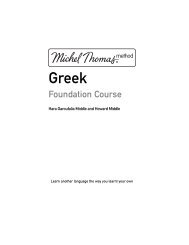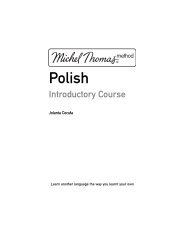MTM Foundation Polish:Polish - Michel Thomas
MTM Foundation Polish:Polish - Michel Thomas
MTM Foundation Polish:Polish - Michel Thomas
You also want an ePaper? Increase the reach of your titles
YUMPU automatically turns print PDFs into web optimized ePapers that Google loves.
28<br />
będziecie ‘you won’t be’: będziecie tam wieczorem? ‘will you be there<br />
in the evening?’; będziecie gotować? ‘will you be cooking?’<br />
CD6 Track 7<br />
będziecie mieszkać ‘you (pl. inf.) will live, be living’: będziecie<br />
mieszkać w Anglii? ‘are you going to live in England?’ (talking to a<br />
group of people informally).<br />
In the present tense of the verb ‘to prefer’ the ‘you’ (pl. inf.) form is<br />
wolicie, and the ‘we’ form is wolimy: dlaczego wolicie mieszkać w<br />
Anglii? ‘why do you prefer to live in England?’; wolimy mieszkać w<br />
Ameryce ‘we prefer to live in America’.<br />
The ‘they’ form of ‘to go on foot’ in the present tense has the ending<br />
-ą: idą ‘(they) go, are going’. The same ending is used in the future<br />
tense: będą ‘(they) will be’: gdzie oni będą mieszkać? ‘where are they<br />
(masc. / mixed group) going to live?’; one będą mieszkać w Polsce<br />
‘they (fem.) will live in Poland’.<br />
CD6 Track 8<br />
ja też ‘I also, me too’. Ja is needed in sentences containing ‘also’ as<br />
it is emphatic: ja też będę tutaj jutro ‘I also will be here tomorrow’.<br />
czekać ‘to wait’: będę czekać ‘I will be waiting’; oni / one będą czekać<br />
‘they will be waiting’; ona będzie czekać ‘she will be waiting’.<br />
The ‘for’ as in ‘wait for’ is na in <strong>Polish</strong>: na mnie ‘for me’, na pana ‘for<br />
you’ (talking to a man formally), na panią ‘for you’ (talking to a woman<br />
formally): oni będę tutaj na panią czekać ‘they (masc. / mixed group)<br />
will be waiting for you here’.<br />
wiecie ‘you know’ (pl. inf.); przepraszamy ‘we are sorry’; dzisiaj<br />
wieczorem ‘today in the evening’ = ‘this evening’: czy pani wie co ona<br />
będzie robić dzisiaj wieczorem? ‘do you (fem.) know what she will be<br />
doing this evening?’<br />
to samo co ja ‘the same what I’ = ‘the same as me’: ona będzie robić<br />
to samo co ja ‘she will be doing the same as me’.<br />
przepraszam pana / panią ‘excuse me, sir / madam’ – apologising to,<br />
or attracting the attention of, a specific person.










